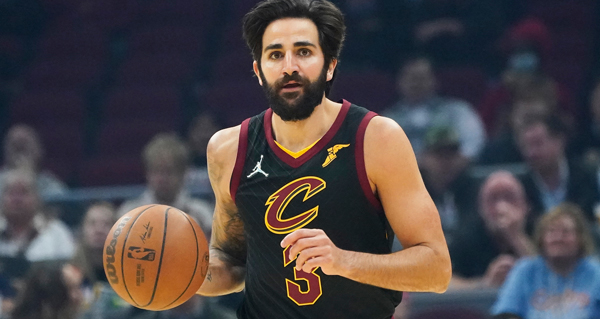Ricky Rubio retired from the NBA as the calendar was turning over. This was not exactly a surprise. He'd played thirty-odd games in each of the past two seasons and hadn't yet participated in the 2023-24 edition due to vaguely defined mental health issues. His ACL tear in late 2021, him bending back in alarm as he terminated a drive, had a final feeling about it. Rubio's career had been pulsar-like, increasingly fragile as he aged into his conspicuously creaky thirties. We weren't sure before it happened that he had that brief, beautiful Cleveland Cavaliers run left in him, where he was casting the shores of Lake Erie in the glow of what my friend Damon calls The Ricky Rubio Experience. In short: bad shooting, a few remarkable assists, and a plus-minus so deep in the black that you think the stat is broken. Ricky Rubio was inarguably helping a fun young Cavs squad win ballgames, in his unique and ebullient way, and then he got hurt. This was both more than the basketball-watching public could have hoped for, and more disappointing for us, having seen what he was still capable of. But careers do end, usually rather unceremoniously.
About that pulsar-like quaity: Rubio was a sensation at age 18, holding his own against America's best in the 2008 Olympics. Then he disappeared for a few years—the Wolves drafted him in 2009, but couldn't afford to bring him stateside—and didn't land in the NBA until 2011. His rookie year was revelatory, but cut short by a blown ACL. It took him a while to fully recover from that injury; he couldn't achieve the levels of incautiousness that typify the Ricky Rubio Experience. As the magic began to course through him again, as he flew up and down the floor on a Wolves team that somehow missed the playoffs in 2014, Kevin Love left Minnesota for Cleveland, and the Wolves plunged back into irrelevance. Ricky was good in Utah in '17-'18, posting the playoff series of his life in the opening round against the Russ and Paul George Thunder. In the closeout game of that tilt, he tweaked his hamstring and didn't feature in the Jazz's second round loss to the Rockets. He spread the next four years among four teams, the second ACL tear finishing him off.
Those are Ricky Rubio's career highlights, and the blank spaces between them. He seemed, as the passage of time compresses the finer details, like he was always peaking brilliantly or in the midst of a lull from which he might never emerge, but he was also a consistent presence. He played with a literal generosity, and had a generous personality. You can imagine certain basketball players—Kobe is the example that comes to mind—as great individual athletes, tennis players or golfers. Ricky Rubio made sense only in the context of a team game. His self-expression required the involvement of others. In that way, he appeared to be perfectly at home on a basketball court.
Of course jobs are limiting, particuarly ones that involve as much travel and as many hours onsite as NBA Point Guard does. Given those facts, Rubio's recent disclosure, in a Jon Krawczynski-penned piece for The Athletic, that he has spent stretches of his career depressed—and had, before this recent sabbatical that transitioned into his retirement, been going through it something awful—doesn't come as a shock. But it is incongruous with the joyful on-court figure he cut for twelve seasons.
Watching Rubio, you had the sense of a person who had either been blessed with a cheerful disposition, or who had figured a few crucial things out. Perhaps the latter. That famous-among-League-Pass-dorks clip of him exhorting Alexey Shved to "change this face," while being quite funny, has an undercurrent of hard-earned wisdom. Like: Buddy, this gig will eat you alive.
It sounds like Rubio felt partially entombed by his own positivity: "Sometimes [the whole Happy Ricky act] was me lying to myself, saying, ‘Don’t feel that way’ because it might stop you." He also mentions his aborted adolescence, going pro with DKV Joventut at age 14. He expresses regret over having to grow up too fast. That, too, makes sense. The physical and psychological space he traversed over his early teenage years and into his early twenties was immense. More than maybe anyone could take, without at some point wondering wait, how the hell did I end up here? Doubly complicated by here being the upper midwest. The guy was born in a suburb of Barcelona, which is quite different from Minneapolis, and Salt Lake City, and Phoenix, and Cleveland.
He is back home, now. In addition to shedding light on what he's been suffering through, he has announced that he's training with ACB Barcelona, where he played 140 games and won several trophies. The captain of Rubio's teams, Roger Grimau, is Barca's head coach. Whether this is the beginning of an NBA comeback is not terribly important; the headline is that Rubio feels well enough to get back into basketball shape, to once again explore what he can do on the court. If the extent of that exploration is just him playing some scrimmages, chatting with old friends, and then driving home to hang out with his family, that's fine. It sounds really nice, actually. Surely some part of Ricky Rubio is bound up in being a basketball player, but he seems to understand that it's a secondary thing. From that knowledge, he'll pursue his own happiness. It's a good start, at least.



